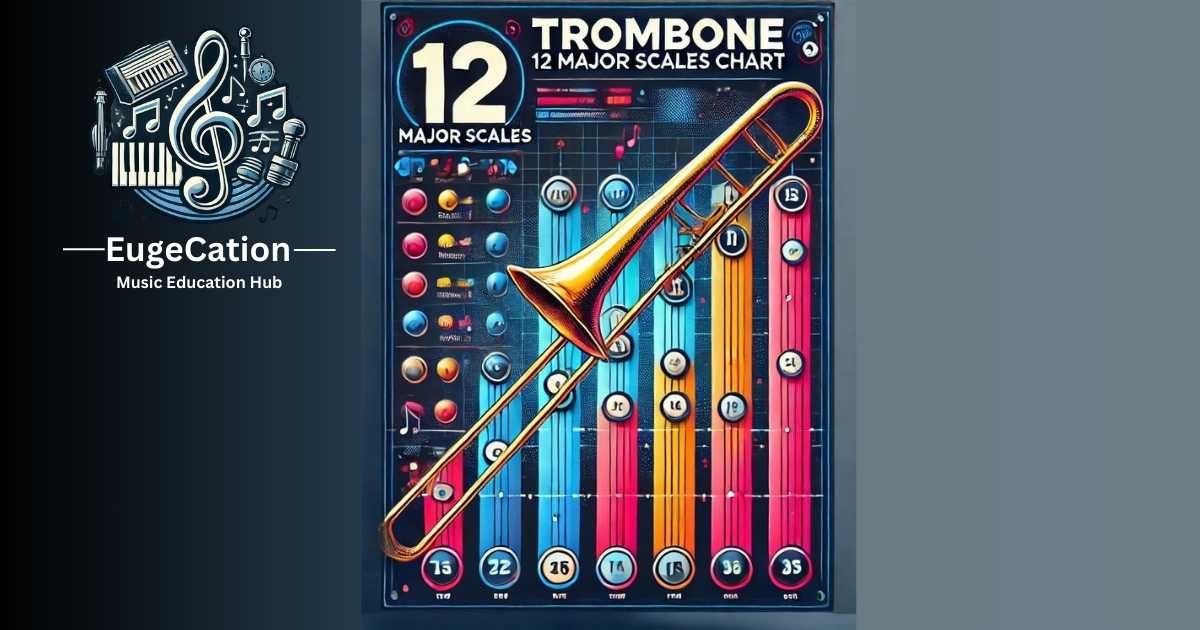Simple Trombone 12 Major Scales PDF
Original price was: $0.65.$0.00Current price is: $0.00.
Description
The Trombone 12 Major Scales are fundamental components of music education and practice for trombone players. They offer a strong basis in music theory and performance techniques that are crucial for achieving mastery of this versatile brass instrument.
The Importance of Practicing Scales
Engaging in scale practice on the trombone is crucial for musicians of all skill levels, as it contributes to the development of finger strength, intonation, and proficiency in musical techniques. When you commit to regular scale practice, you enhance your muscle memory, enabling you to navigate through diverse musical passages with precision and accuracy. This consistent practice also aids in ear training, deepening your understanding of pitch and harmonies. Moreover, mastering scales allows you to refine your breathing control and embouchure technique, essential elements of trombone performance. By gradually incorporating scales of varying difficulty levels into your daily practice regimen, you will observe significant enhancements in your overall performance abilities and musical fluency.
Key Signatures and Fingerings
For beginners looking to learn the 12 major scales on the trombone, understanding key signatures and proper fingerings is essential. This knowledge serves as the foundation for accurate and efficient playing. Key signatures in music serve as indicators of the sharps or flats present throughout a piece. Each major scale contains a specific set of notes, and recognizing these patterns is crucial for skill development on the instrument.
Trombonists must commit to memory the correct fingerings for each key in order to play with precision. Utilizing charts and diagrams can be particularly helpful in visualizing the finger placements required for different scales, aiding beginners in grasping these concepts more easily. Consistent practice and attention to details such as fingerings are key to establishing a solid groundwork for trombone playing proficiency.
Tips for Mastering Trombone 12 Major Scales
Achieving mastery in trombone scales necessitates a blend of efficient practice methodologies, unwavering dedication, and the utilization of appropriate exercises customized to various proficiency levels, whether you are classified as a beginner, intermediate, or advanced player.
Effective Practice Techniques
Effective practice techniques for trombone scales involve utilizing structured warm-ups, maintaining consistent practice routines, and engaging in instructional exercises that target specific areas requiring improvement. One essential warm-up exercise is to initiate with long tones to emphasize tone production and breath control. Integration of articulation exercises, such as tonguing patterns and slurs, is beneficial for refining technique and enhancing precision. The incorporation of scale-specific instructional materials, such as scale books or online resources, offers a systematic approach to mastering diverse scale patterns and intervals. Breaking down scales into smaller sections and practicing them with various rhythms and articulations serves to further augment a trombone player’s familiarity and proficiency with scales.
Benefits of Learning Trombone 12 Major Scales
Mastering the major scales on the trombone will provide you with a host of advantages. These include heightened musicality, refined performance abilities, and a comprehensive comprehension of music theory. These benefits work together to cultivate a more skilled and versatile musician.
Improving Technique and Musicality
Improving your technique and musicality through the practice of major scales on the trombone is crucial for attaining a higher level of performance and expression in music. Mastering major scales on the trombone not only enhances your technical proficiency but also plays a significant role in developing your overall musical expression. When incorporating various articulation exercises while practicing scales, you can enhance your control over dynamics and phrasing. Emphasizing intonation and tone quality during scale practice can refine your sound production, leading to a more polished performance. By consistently working on scales, trombone players can establish a strong foundation that results in smoother transitions and heightened musicality during their playing.
Additional Resources for Trombone Scales
To assist trombone players in mastering scales, various supplemental resources are accessible, such as instructional materials, online lessons, and downloadable sheet music tailored to diverse learning preferences and proficiency levels.
Online Tools and Printable PDFs
You have access to a variety of online tools and printable PDFs that provide free and downloadable resources for trombone players like yourself to practice scales. These resources offer accessible and convenient options for enhancing your musical skills. By utilizing these digital aids, you can access a wide range of scale exercises tailored to your specific needs, ranging from basic to advanced levels. With just a click, you can explore interactive tutorials, engaging lessons, and detailed practice guides that will help you sharpen your technique and improve pitch accuracy.
The availability of printable PDFs allows you to carry your practice materials wherever you go, making it easier for you to stay consistent in your regimen and track your progress over time. By integrating these tools into your practice routine, you can enhance your skillset and develop a solid foundation in trombone performance. [Also check this Yamaha diagram and my other post with “11 Best Resources For Trombone Lessons.”]

Frequently Asked Questions
What are the 12 major scales on the trombone?
The 12 major scales on the trombone are C, G, D, A, E, B, F#, Db, Ab, Eb, Bb, and F. Each scale starts and ends on its respective note.
Why is it important to learn the 12 major scales on the trombone?
Learning the 12 major scales on the trombone is important because it helps develop a strong foundation in music theory and technique. It also allows for easier transposition and improvisation in various musical styles.
Are there any tips for practicing the 12 major scales on the trombone?
Yes, some tips for practicing the 12 major scales on the trombone include starting slowly and gradually increasing the speed, using a metronome for consistent tempo, and focusing on proper hand and slide positioning for each scale.
Can I use the 12 major scales PDF on a different instrument?
While the scales are specifically written for the trombone, they can also be used on other instruments with similar scales such as the trumpet, saxophone, or baritone. You may need to adjust the fingering or slide positions to match your instrument.
Additional information
| Instrument | Trombone |
|---|---|
| Level | Beginner |
| Type | Sheet Music |







Reviews
There are no reviews yet.